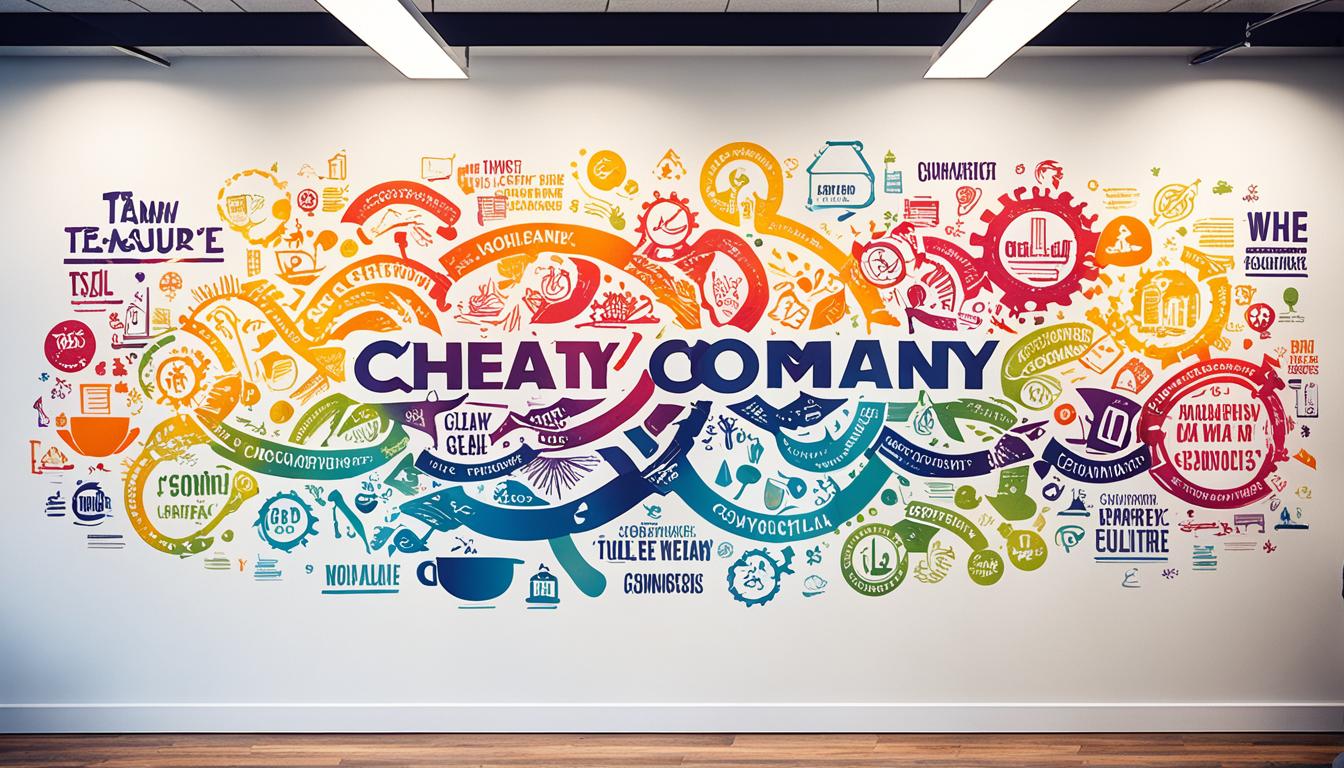Did you know a good company culture can boost productivity by 20-30%? It’s more than just a word. Positive company culture is a key part of business success. By understanding what company culture is, organizations can have a happy and productive team.
Key Takeaways:
- Company culture refers to the norms, values, and behaviors that define an organization.
- It goes beyond superficial perks and influences how employees interact and perform.
- A positive company culture promotes employee engagement, productivity, and innovation.
- Effective company culture contributes to employee satisfaction, reduces turnover, and attracts top talent.
- Understanding the definition and importance of company culture is essential for business success.
What Is Company Culture?
Company culture is the shared norms, values, attitudes, and practices within a company. It’s the invisible bond that connects everyone. This bond guides how work is done. The corporate culture values define what a company stands for. They also impact how employees act.
There isn’t just one company culture definition. It’s made of many parts. For instance, a company’s mission and values show its aims and values. Then, there’s the part that focuses on rewarding and celebrating good work. Also, how a company handles its employees’ performance reflects its culture.
“Company culture is the shared norms, values, attitudes, and practices that form the collective identity of a company.”
A strong corporate culture is vital. It guides the whole organization. It gives a common way of thinking. This helps everyone know what’s important. When culture and values match, it makes a better workplace. This leads to better cooperation and happiness among the employees.
| Company Culture Elements | Explanation |
|---|---|
| Company Missions and Values | The purpose and principles that guide the company’s actions and decision-making. |
| Recognition and Celebrations | Events and rewards that acknowledge and reinforce positive behaviors and achievements. |
| Approach to Employee Performance | The company’s policies, feedback mechanisms, and reward systems relating to employee performance. |
What Is Good Company Culture?
Good company culture is more than cool perks and events. It’s about living the business’s values every day. This makes a place where everyone feels they belong and are safe. In these settings, workers can do great things, and being ethical matters a lot. It makes work better, keeps people around longer, and sparks new ideas, making customers happy.
Creating a good culture is vital for a work environment that works well. It needs to cover the company’s beliefs and how people act. This approach lets everyone shine and help the company reach its targets.
Good company culture isn’t just what you see or do now and then. It’s about having a real mission, trust, and sharing the same big picture. It’s not something you can fake; it’s what your company truly is.
When a workplace culture is strong, it ties everyone to the same mission. People know what’s expected of them and act accordingly. This unity boosts their motivation and effort, leading to better results.
Also, a welcoming culture helps employees feel good at work. They know they’re respected and safe, which is good for their health. Happy workers often stick around, saving the company from the costs of finding and training new hires.
Benefits of an Effective Company Culture:
- Increased employee engagement and productivity
- Higher employee satisfaction and well-being
- Reduced turnover and recruitment costs
- Enhanced innovation and creativity
- Improved customer satisfaction and loyalty
Ultimately, a strong company culture is essential for a successful workplace. Leaders must live the company values and put people first. This approach can make employees truly shine, and drive the company to shine too, in the long run.

Why Is Company Culture Important?
Company culture is crucial for a business. It affects how engaged employees are, how productive they are, and even the service customers get. A good culture helps the company grow by keeping employees happy and motivated.
1. Employee Retention: It makes employees feel like they belong, which makes them want to stay. They value the company’s goals and feel part of something important. This means less quitting and fewer costs in finding and training new people.
2. Increased Innovation: A culture that values creativity and team work helps new ideas shine. When employees can freely share their thoughts, creativity blooms. Including all voices makes this even better. It creates a place where trying new things is encouraged.
3. Enhanced Customer Service: Caring about the customer leads to better service. Workers who understand this strive to do their best. This means happier customers who then talk positively about the brand.

4. Competitive Advantage in Attracting Top Talent: Great company culture not only keeps current employees but also draws in new ones. It shows job seekers that the company is about more than just work. They want to be somewhere their beliefs are shared and they’re supported.
5. Flexibility and Adaptability: A strong culture helps a company face tough times. This was seen during COVID-19. It allowed for quick changes in how work was done, helping everyone to keep working safely and stay connected.
6. Physical Safety: Safety at work starts with the company’s culture. A focus on safety and well-being means fewer accidents. It ensures that work doesn’t harm anyone.
Having a good culture means organizations can do amazing things through their people. It’s the key to continued growth and success.
How To Establish a Good Company Culture
Building a strong corporate culture is key to success. It starts with clearly stating the organization’s goals and values. This forms the basis for a culture where everyone is on the same page.
Good leadership is essential in creating the right culture. Leaders show the values in action. This helps the culture become something all employees want to be part of.
Open and consistent talking is vital. It’s about discussing the culture and what it means for actions and attitudes. This helps employees know how they should act.
“The culture of a company is the behavior of its leaders.” – John Doerr
Everyday activities should reflect the company’s culture. This includes how decisions are made and how employees are praised. New team members should learn about the culture right from the start.
Employee Feedback and Continuous Improvement
Listening to what employees say is crucial. Their insights can show where the culture can be better. Having ways for employees to give feedback, like surveys, helps them be part of the culture’s growth.
Using employee feedback to improve keeps the culture strong. It deals with any problems and promotes a workplace where people feel valued. Valuing what employees suggest helps them feel more connected and committed.
Key Steps to Establishing a Good Company Culture
| Action Steps | Description |
|---|---|
| Define mission, vision, and values | Clearly articulate the organization’s purpose, goals, and guiding principles |
| Lead by example | Leaders must embody the desired culture and consistently exhibit the expected behaviors |
| Communicate culture openly | Regularly discuss the definition of the company culture and its importance to the success of the organization |
| Integrate culture into everyday activities | Ensure that all aspects of the organization, from policies to employee programs, align with and support the desired culture |
| Seek employee feedback | Actively solicit employee input, listen to their perspectives, and incorporate their ideas into culture refinement |

Company Culture: What Employees Think
Employees’ views on company culture matter a lot. How they see and experience culture affects how well it works. Employers need to listen to what their staff say about the culture. This feedback helps them understand how to make things better.
A workplace culture that is welcoming and supportive means a lot to workers. When they feel their opinions and efforts count, they do better. They stay longer and are happier in a space that helps them grow and offers support.
“A positive company culture that fosters transparency, collaboration, and respect empowers employees to bring their whole selves to work. This kind of environment cultivates trust, encourages creativity, and enhances overall job satisfaction. It’s incredibly motivating to be part of a company culture that values and invests in its people.” – Sarah Thompson, Marketing Manager at XYZ Corporation
Involving employees in developing culture makes them feel more connected and trusted. Feedback helps see where the culture can improve. This includes better communication, more inclusion, a balance between work and personal life, and career growth.
Using tools like surveys and focus groups can highlight what employees think. And one-on-one talks can give deeper insights. Leaders can then use this information to make the culture even better.
Examples of Corporate Culture
Here’s how some companies have developed their cultures:
- A tech startup where staff get time for personal projects, leading to new ideas and growth.
- A retail company that plans team events, building a sense of unity.
- A bank that allows flexible hours and working from home to maintain a good life-work balance.
- A health group that urges kindness to patients, creating a caring workforce.
These cases show the various methods of applying company culture. They prove its value in both staff satisfaction and organizational success.
In the end, understanding staff thoughts on culture is key to a company’s success. By acting on feedback and including what staff seek, a strong culture forms. This leads to happier, more committed employees.
Building an Effective Company Culture
To have a positive work setting, building a strong company culture is key. It makes employees happier, more involved, and helps the company do better. There are important steps to take to make this happen.
1. Identifying Values-Aligned Candidates
Hiring people who fit your company’s values is crucial. Yes, they need the right skills, but they should believe in what your company stands for. This way, your team works together better and achieves more.
2. Integrating Values into Everyday Activities
The company’s values should be everywhere. They should show in meetings, how decisions are made, and how people talk to each other. Doing this will make sure everyone is on the same page and working towards the same goals.
3. Fostering Feedback Culture
Open communication is key to a strong culture. Encourage your team to speak up. Listen to their ideas and concerns. Use what they say to make your company better.
4. Adapting to Changes
Company cultures should grow and change with the times. Be open to new ideas and ways of doing things. This keeps your culture fresh and in line with the future.
5. Rewarding Employee Contributions
It’s important to reward the hard work of your team. Offer bonuses, public recognition, or chances for growth. By doing this, your team knows they are valued.

Creating a strong company culture is everyone’s job. Leaders and team members must work together. Address problems early and keep checking in with your team. A culture that’s focused on values attracts the best talent and keeps them engaged. This leads to long-term success.
The Benefits of a Strong Company Culture
A strong company culture is key to a good work environment. It offers many benefits for both employees and companies. It leads to more involvement, better work, more fresh ideas, and a constant drive for new methods.
A good culture also has major effects on business achievements. It helps in many ways:
1. Improved Morale
It makes employees feel they belong and have a purpose. They share the same values and vision. This inspiration boosts their mood and work quality. This, in turn, makes them happier and more content with their jobs.
2. Attraction of Top Talent
Great cultures attract top workers. Proud employees talk positively about their workplace. This word-of-mouth is powerful. Besides quality, it cuts recruitment costs by pulling in those who share your values.
3. Reduced Turnover and Recruitment Costs
A great culture keeps turnover low. Happy and linked staff are more inclined to stay. This cuts the costs of hiring and training new people.
4. Higher Financial Returns
Investing in culture often pays off financially. Engaged staff are more productive. They also make customers happier. A culture that values teamwork and new ideas helps businesses stand out.
5. Enhanced Customer Satisfaction
Happy workers boost customer service. A focused culture on customer care boosts satisfaction. This improves loyalty and keeps customers coming back.
A strong culture is the core of business success. It aids in creating a nurturing, inventive, and cooperative space. By focusing on culture, companies can meet targets, draw in the best, and overcome obstacles.
How Important Is Company Culture in Building a Positive Work Environment?
Company culture plays a crucial role in creating a positive work environment. By taking intentional steps to building positive culture , employees feel valued, motivated, and engaged. A strong company culture promotes teamwork, innovation, and overall job satisfaction. It sets the foundation for a thriving and harmonious workplace.
, employees feel valued, motivated, and engaged. A strong company culture promotes teamwork, innovation, and overall job satisfaction. It sets the foundation for a thriving and harmonious workplace.
Conclusion
Company culture is what makes a workplace unique and boosts success. It’s not just about appearances. It’s about the values and behavior that define the organization. A strong culture helps employees feel connected and inspired.
Leaders set the tone with core values, guiding employees in their daily work. These values encourage people to live the culture. Communication, feedback, and always looking to get better are vital.
Great company culture lifts employee spirits and also affects profits and customer happiness. It’s a key part of being ready for any changes or tough times. A good culture makes a company strong and flexible.
FAQ
What is company culture?
Company culture is like a group’s personality. It’s made up of things everyone in the company believes and values. These shape how the company acts and works together.
What makes a good company culture?
Good company culture means the company’s values are at the heart of everything. It makes employees feel like they belong and are safe.
Why is company culture important?
It’s key because it impacts how well a business does. This includes how happy its employees are, how much work they do, and how well they serve customers.
How can I establish a good company culture?
Establishing a solid culture starts with clearly stating what the company is about. Then, make sure every part of the company follows these values and mission.
What do employees think about company culture?
What employees think really matters for the culture to work. So, it’s crucial to ask them how they feel and what can be done better.
How can I build an effective company culture?
Hire people who believe in what your company stands for. And make sure these values guide daily work and decisions.
What are the benefits of a strong company culture?
A strong culture boosts how much work employees do. It makes them more creative and happy. This also helps companies save money by keeping their best people.
What is the definition of company culture?
Company culture is what drives a business. It’s the shared beliefs and habits of everyone in the company. This makes each organization unique.

